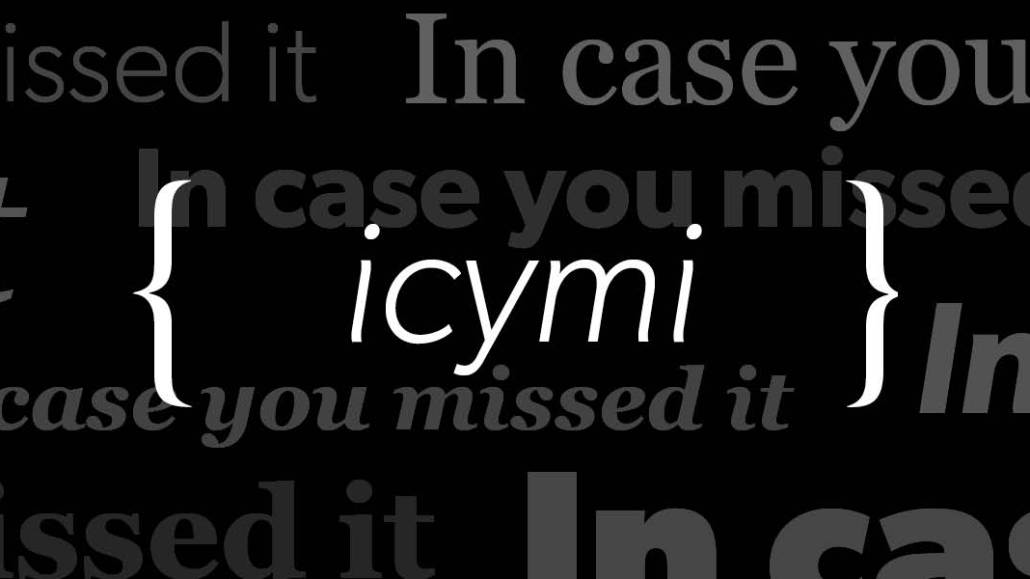Secure your place at the Digiday Publishing Summit in Vail, March 23-25
Best of the week: Media rivals team up amid frustrations with platforms

This week, the dominant theme of our top stories was publishers and brands expressing continued displeasure and new fears regarding the duopoly. And they’re pushing back against the platforms, individually and in partnerships. A full list of our top stories is at the bottom.
Google’s ad-blocking plan raises suspicion
In the wake of The Wall Street Journal’s report that Google is pursuing an ad blocker for its Chrome browser, Lucia Moses sums up the conspiracy theories that abounded about Google’s other, hidden motives. Remember: It’s not being paranoid if the platforms are really out to get you.
Facebook continues to frustrate publishers and brands
The discontent with the duopoly’s other member has persisted as well. Publishers are fed up with Facebook’s Instant Articles and its inability to make them money, with The New York Times and The Guardian pulling out of the fast-loading mobile articles feature, Ross Benes reports.
“If IA monetization doesn’t dramatically improve, high-quality publishers will continue to pull out,” said Dan Check, vice chairman of Slate, which publishes most of its Facebook articles to IA.
But publishers say Facebook can save IA by improving its subscription products, giving them more control over their inventory and providing more user data. Even so, some doubt the platform will make adjustments. “Facebook doesn’t want pubs to create and capture value within Facebook that they can take elsewhere,” one publishing executive said. “But it definitely helps that this is a public flop.”
Turns out brands are also unhappy with the platform, too. As Facebook has grown, so have their complaints about it — and demands for more control.
Marketers gripe that Facebook has become more confusing to work with as it has expanded, and it often pushes its own agenda. That, along with the platform’s metrics blunders, has them trying to wrestle power back from it. For some marketers, the playbook has gone from “do whatever Facebook says” to “do your own thing,” Shareen Pathak writes.
Media companies join forces against the duopoly
Some media companies are taking the approach of partnering with rivals to compete for ad dollars, betting it’s better to work together than to individually lose out entirely, Sahil Patel reports.
Last month, Condé Nast, Vox Media and NBCUniversal announced they were teaming up on ad sales pitches. Under the deal, Condé Nast’s titles will make their ad inventory available in Concert, a private marketplace that includes Vox Media and NBCU digital properties. Together, these companies said they can now offer advertisers the ability to reach 200 million consumers, citing comScore.
These alliances are forming at all levels — from big TV giants to small digital publishers — and across media types. Nat Geo started pitching advertisers on a new social content offering called Further Community that included Mashable, theSkimm and Atlas Obscura. In TV, Viacom, Turner and Fox Networks have formed OpenAP, a targeting platform and independent business.
Ad buyers say they’re receptive to these partnerships. Christine Peterson, digital investment lead for Mindshare North America, which is reviewing Concert for a number of clients, said the Condé Nast-Vox-NBCU deal has scale, but it’s the data targeting and measurement, plus high-quality content and brand-safe environments that put it over the top. “When it’s well thought out and incorporates data, then it does belong in a competitive landscape closer to the duopoly,” she said.
This week’s top stories:
A guide to the Google ad-blocking conspiracy theories
Publishers say Facebook can save Instant Articles with better data, subscription tools
As Facebook grows, brands say it’s gotten more complicated to work with
In the shadow of the duopoly, media rivals are becoming allies
“If ESPN can’t make it, who can?”: The age of media austerity
#The Hustler: How Gary Vee became the ad industry’s lightning rod
Why luxury remains far out of reach for Amazon and Walmart
“I’m just wired differently”: Why advertising seems to have so many people with dyslexia
More in Media

Why more brands are rethinking influencer marketing with gamified micro-creator programs
Brands like Urban Outfitters and American Eagle are embracing a new, micro-creator-focused approach to influencer marketing. Why now?

WTF is pay per ‘demonstrated’ value in AI content licensing?
Publishers and tech companies are developing a “pay by demonstrated value” model in AI content licensing that ties compensation to usage.

The case for and against publisher content marketplaces
The debate isn’t whether publishers want marketplaces. It’s whether the economics support them.








